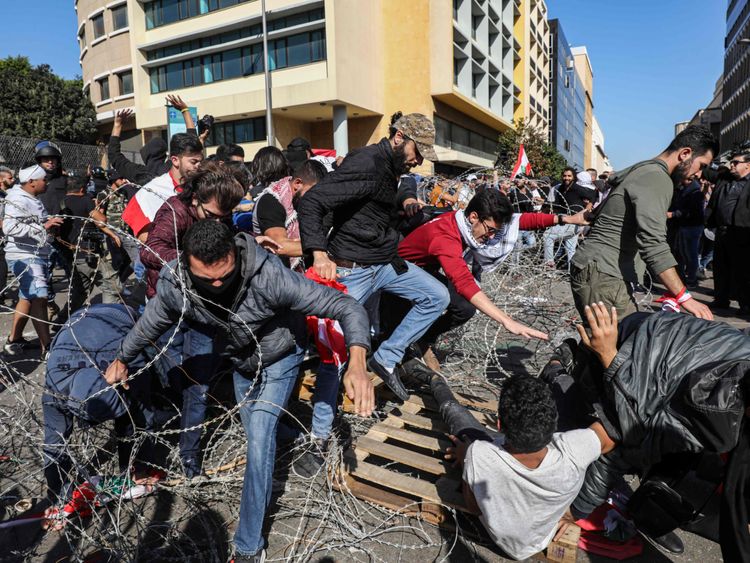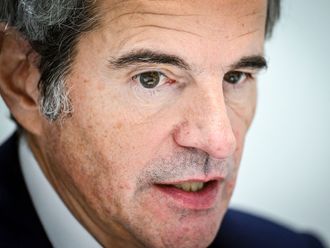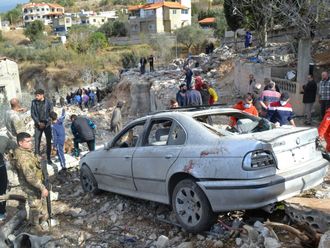Beirut: Lebanon’s parliament, besieged by angry protesters, Tuesday for a second time postponed a session that had been due to discuss draft laws which critics charge would let corrupt politicians off the hook.
From early morning, hundreds of noisy demonstrators and riot police had faced off and at times scuffled outside the assembly in Beirut, with activists also trying to block MPs’ convoys.
“Revolution, revolution,” chanted the protesters, punching the air with their fists and waving Lebanese flags, in the latest rally in over a month of street protests.
“This parliament is ours,” chanted one woman through a megaphone as others banged pots and pans.
Then, shortly before noon and after several parties had said they would boycott the session, parliament official Adnane Daher appeared before TV cameras.
“The session has been postponed to a date to be determined later,” he said, citing “exceptional conditions, in particular security conditions”.
“This is a new achievement for the revolution,” cheered Mohammad Ataya, a 28-year-old demonstrator, vowing that no session would be held “as long as the people control the street”.
‘Great danger’
Lebanon, its economy in turmoil, has since October 17 been rocked by an unprecedented wave of popular street revolts that have cut across sectarian lines.
What started with protests against government plans to tax online phone calls made through WhatsApp and other online providers has turned into a broader popular revolt against the perceived ineptitude and corruption of the entire ruling class.
Amid the month-old crisis the prime minister, Sa’ad Hariri, bowed to street pressure and resigned on October 29, but the parliamentary consultations needed to form a new government have yet to be started.
A former minister, Mohammad Safadi, who had been considered to replace Hariri, has withdrawn his bid for the top job after more massive protests.
Tuesday’s plans for a parliamentary session, already postponed by a week, had further stoked anger as MPs were scheduled to discuss a bill to grant an amnesty to thousands convicted of a range of offences.
The anti-government demonstrators see the draft law as a way to exonerate people convicted or suspected of involvement in crimes ranging from tax evasion to breaches of environmental regulations.
“They want an amnesty to escape (charges) of tax evasion and to release criminals onto the streets,” said one activist who gave her name as Tracy, 24, and who criticised the “illegitimate” parliament.
The specialist non-government group Legal Agenda labelled the proposed law “a great danger”.
The parliamentarians had also been due to consider a bill to create a court specialising in financial crimes and the mismanagement of public funds, whose judges would be appointed by the legislature, raising further fears of conflicts of interest.
Banks reopen
Lebanon’s street protests, including widespread roadblocks with burning car tyres, have at times brought the country close to a standstill, and sent the already struggling economy deeper into crisis.
Amid the turmoil, banks stayed shut for weeks and restricted withdrawals, foreign currency transactions and access to dollars, often causing bank clients’ tempers to flare.
In rare good news for Lebanese citizens, banks were due to reopen on Tuesday.
The Federation of Syndicates of Banks Employees in Lebanon had announced the end of a strike on Monday, saying new security measures had been agreed with authorities to protect banks.
The Lebanese pound has been pegged to the US dollar at around 1,500 for two decades and the currencies are used interchangeably in daily life.
But amid the deepening economic crisis, the exchange rate in the parallel market has surpassed 1,800 Lebanese pounds for every dollar.
The Association of Banks in Lebanon announced on Sunday “temporary” arrangements authorising the withdrawal of $1,000 per week for those with accounts in US dollars.












